Live on the homepage now!
Reader Supported News
The ex-president will be charged with willful retention of documents under the Espionage Act and six other crimes, his lawyer said.
Trump reacted in predictable fashion to the news, which was delivered by prosecutors in an email, ranting about the “Boxes Hoax” on his social media platform Truth Social.
“I have been summoned to appear at the Federal Courthouse in Miami on Tuesday, at 3 PM.,” he wrote. “This is indeed a DARK DAY for the United States of America. We are a Country in serious and rapid Decline, but together we will Make America Great Again!”
A spokesman for Department of Justice Special Counsel Jack Smith, who has been handling this investigation, declined to comment to The Daily Beast.
James Trusty, one of Trump's lead defense lawyers in this case, said on CNN that the team has not seen the actual indictment and might not until they show up at the federal courthouse next week.
But he said a summary sheet that accompanied the summons mentioned a number of criminal charges, including “willful retention of documents,” which is a violation of the Espionage Act, “conspiracy to obstruct” a law enforcement investigation, and making “false statements.”
None of those would be a surprise, but accusations of a conspiracy notably would mean that the feds discovered that someone—or several others—tried to help the former president allegedly commit a cover-up.
The Espionage Act is a 1917 law put in place to crack down on disloyal Americans and spies stealing secrets during wartime. “Willful retention of documents” is an element of 18 U.S.C. § 793, one of the statutes cited by the FBI when special agents searched Trump’s Palm Beach estate at Mar-a-Lago in August.
Federal law makes it illegal to have “unauthorized possession” of “information relating to the national defense” that could injure the country—and it would similarly violate the law to “willfully retain” the documents by failing to turn it over to the feds. The latter alone carries a hefty penalty of up to 10 years in prison, plus a fine.
Late Thursday night, Trusty expanded on the charges during an interview with conservative-friendly Fox News host Laura Ingraham, where he said Trump was in “initial shock” and that his team has only received a summary of the accusations. He counted “several types of obstruction, conspiracy, and false statements,” describing it as the special counsel throwing “everything and the kitchen sink” at the former president.
He also previewed aspects of Trump’s upcoming defense in court, posturing that “you can’t obstruct a non-crime” on the unsupported theory that as a former president, Trump had the unfettered power to handle the nation’s secrets however he wished.
“He could have had a party throwing stuff in a bonfire and it wouldn't have been obstruction,” Trusty said, curiously raising even more unanswered questions about what exactly Trump did with the records he repeatedly refused to turn over to the DOJ.
Trusty also explained how he and fellow defense lawyers made a last-ditch effort to convince Smith and his team to drop the threatening investigation—pushing the unsupported conspiracy theory that President Joe Biden himself was somehow behind the indictment.
“This was basically trying to appeal for somebody in that Praetorian guard to have a conscience,” Trusty said, comparing the team of assembled federal prosecutors to the feared elite bodyguards who once served Roman emperors.
During the interview, Trusty also signaled another potential defense: that the initial FBI raid violated the Constitution's Fourth Amendment right against unfair searches.
The unprecedented move to indict Trump—an investigation that was nearly two years in the making—marks the second time in the country’s history that an American president has been criminally charged after leaving office. The first time was in April, when the Manhattan District Attorney charged Trump with 34 felony counts of falsifying business records.
It sent MAGA loyalists into hyperventilation mode; right-winger Mike Cernovich tweeted, “This is the JFK assassination all over again.”
Vivek Ramaswamy, who is running against Trump for the GOP nomination for president, said he would pardon him in the unlikely event he is elected. Even Ron DeSantis, whose fight with Trump for the nomination has grown increasingly nasty, slammed prosecutors for being overly “zealous” in their pursuit of Trump.
The Mar-a-Lago case stems from a dispute Trump had with the bureaucrats at the National Archives and Records Administration, the historians who are tasked with preserving an account of each outgoing president. After leaving the White House, Trump initially refused to turn over records they requested. When he finally did, it was clear he’d been holding a number of documents with secret and top secret classification markings.
For months, Trump has been fighting to slow down the federal investigation. His attorneys successfully schemed to land a friendly judge in South Florida who briefly stopped the FBI from reviewing the evidence and later forced a massive document review that tied down the Department of Justice.
On top of the feds probing whether Trump broke the law for keeping classified documents, the Fulton County District Attorney in Atlanta is conducting a criminal inquiry over the way Trump intimidated an elections official there. Trump has repeatedly dismissed all these investigations as politically motivated and seems to be using his 2024 presidential run as cover.
Trump, who was twice impeached by Congress but spared conviction by Republicans in the Senate, is the first of the nation’s 46 presidents over 233 years to be criminally indicted after leaving office.
In a four-minute video taken in front of a painting of a former American president called “The Doctrine Of Monroe,” Trump repeatedly asserted his innocence and called the charges “warfare.”
“I am innocent, and we will prove that very, very soundly and hopefully very quickly,” he said.
In a speech that started in the third person and ripped into the American justice system, Trump dismissed the entire ordeal as nothing more than a baldfaced attempt to snatch away his spectacular return to the White House.
“It's election interference at the highest level,” he said. “They come after me, because now we're leading in the polls again by a lot—against Biden and against the Republicans, by a lot... they figured they way they're going to stop us is by using what's called ‘warfare.’ And that's what it is. This is warfare for the law. And we can’t let it happen. Our country is going to hell, and they come after Donald Trump, weaponizing the Justice Department.”
READ MORE 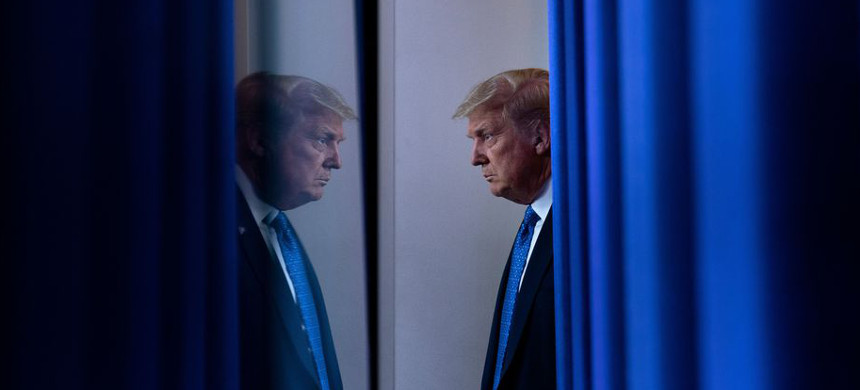 The former president has been indicted again, this time on federal charges related to his handling of classified documents. (photo: AP)
The former president has been indicted again, this time on federal charges related to his handling of classified documents. (photo: AP)
Rolling Stone has confirmed that the former president has been indicted again, this time on federal charges related to his handling of classified documents
The former president announced on Truth Social that “the corrupt Biden Administration” had informed his lawyers that he’s been indicted “seemingly over the Boxes Hoax,” Trump’s pet name for the federal investigation into his handling of classified documents after leaving the White House.
Rolling Stone confirmed the news shortly after Trump’s post. The Justice Department’s indictment includes seven charges related to possession of documents, obstruction, and false statements, a source with knowledge tells Rolling Stone.
Trump wrote that he will appear in court next week: “I have been summoned to appear at the Federal Courthouse in Miami on Tuesday, at 3 PM.
Two people with knowledge of the matter told Rolling Stone that Trump’s lawyers and close allies were on high alert Thursday morning, roughly 12 hours before it was publicly announced that Trump had been indicted in the documents probe. Media surrogates and other higher-profile defenders of Trump were instructed to be on standby, in the event the former president was in fact indicted by the feds Thursday.
Talking points were drafted early. The requisite campaign fundraising appeals were discussed quietly. And some members of Trump’s inner circle spent the day trying to figure out if the chatter of a Thursday indictment were even based in reality, or a rerun of the time earlier this year when Trump announced he’d be arrested on the wrong date.
However, by the evening, the Trumpland rumor mill was vindicated this time. Trump was not happy.
“I AM AN INNOCENT MAN,” Trump wrote after his initial announcement, along with a video message. “THE BIDEN ADMINISTRATION IS TOTALLY CORRUPT. THIS IS ELECTION INTERFERENCE … A CONTINUATION OF THE GREATEST WITCH HUNT OF ALL TIME. MAKE AMERICA GREAT AGAIN!!!”
Trump became the first former president to be indicted in April when Manhattan District Attorney Alvin Bragg charged him with 34 felony counts of falsifying business records related to a hush money payment to porn star Stormy Daniels ahead of the 2016 election. He’s now the first to be indicted on federal charges, too, and more could be coming. Special Counsel Jack Smith, who brought the classified document charges, is still investigating Trump’s role in the effort to overturn the 2020 election. He’s also under investigation in Georgia for meddling with the state’s election results.
Trump has been complaining incessantly about the investigations, alleging they are part of a vast conspiracy to prevent him from retaking the White House. The former president’s rantings on Truth Social became increasingly paranoid this week ahead of the indictment on Thursday. “Wow, this is turning out to be the greatest … most vicious instance of ELECTION INTERFERENCE in the history of our Country,” he wrote Wednesday in a typical post.
Trump’s legal team met with Smith earlier in the week in a last-ditch effort to avoid charges. Rolling Stone confirmed on Wednesday, however, that Trump had been notified he was the target of an ongoing criminal probe, the latest in a string of signals that charges were imminent. Rolling Stone reported last month that Trump’s lawyers had been preparing him to be brought up on federal charges related to the documents investigation.
In August, FBI agents executed a search warrant at Trump’s Mar-a-Lago residence in Palm Beach, Florida. Authorities seized hundreds of classified documents — some of them highly sensitive and pertaining to national security — that Trump took on his way out of the White House. The raid was the culmination of a months-long effort by the National Archives and federal authorities to recover the missing materials, one that included a DOJ subpoena for materials.
Trump has maintained he did nothing wrong, claiming that he declassified all of the material — even suggesting he did so just by thinking about it. The DOJ isn’t convinced, and neither was Trump, apparently. CNN reported last week that investigators obtained a tape of Trump admitting he took a classified document detailing an attack plan on Iran while acknowledging he was aware he couldn’t simply declassify it. Trump dismissed the recording during a Fox News town hall event with Sean Hannity. “All I know is this: everything I did was right,” he said.
It’s unclear how the indictment will impact the race for the Republican nomination. The indictment in New York helped Trump in the polls, and he started fundraising off the latest charges almost immediately after he announced them on Thursday. The fact that most of the Republicans competing against Trump for the nomination — including former Vice President Mike Pence — have defended him against the investigations can only help his cause.
READ MORE  Edward Snowden says 2013 surveillance 'child's play' compared to technology today. (photo: Alamy)
Edward Snowden says 2013 surveillance 'child's play' compared to technology today. (photo: Alamy)
But whistleblower says 2013 surveillance ‘child’s play’ compared to technology today
In an interview on the 10th anniversary of his revelations about the scale of surveillance – some of it illegal – by the US National Security Agency and its British counterpart, GCHQ, he said he had no regrets about what he had done and cited positive changes.
But he is depressed about inroads into privacy both in the physical and digital world. “Technology has grown to be enormously influential,” Snowden said. “If we think about what we saw in 2013 and the capabilities of governments today, 2013 seems like child’s play.”
He expressed concern not only about dangers posed by governments and Big Tech but commercially available video surveillance cameras, facial recognition, artificial intelligence and intrusive spyware such as Pegasus used against dissidents and journalists.
Looking back to 2013, he said: “We trusted the government not to screw us. But they did. We trusted the tech companies not to take advantage of us. But they did. That is going to happen again, because that is the nature of power.”
Snowden has been in exile in Russia since 2013 after fleeing Hong Kong, where he handed over tens of thousands of top-secret documents to journalists.
His detractors denounce him for being in Russia, though it appears to be the only realistic option available to him other than jail in the US. Criticism has intensified since the invasion of Ukraine and his acquisition of Russian citizenship last year, two years after he applied.
But despite his personal predicament, Snowden does not dwell on the past. “I have no regrets,” he said.
Snowden has reduced his public profile over the last two years, giving fewer speeches, and retreating from press interviews and social media. This is partly because of family commitments: he and his wife have two young sons.
But he has remained in contact over the last decade with the three journalists who met him in Hong Kong, including this reporter. Friday marks exactly 10 years since Snowden revealed himself as the source of the leaks.
Snowden views the widespread use of end-to-end encryption as one of the positive legacies of the leaks. The Big Tech companies had been embarrassed by revelations that they had been handing personal data over to the NSA.
That embarrassment turned to anger when further leaks revealed that, in spite of that cooperation, the NSA had been helping themselves to data from the Big Tech companies through backdoor vulnerabilities. In response, in spite of opposition from the agencies, companies rushed in end-to-end encryption years earlier than planned.
End-to-end encryption “was a pipe dream in 2013 when the story broke”, Snowden said. “An enormous fraction of global internet traffic traveled electronically naked. Now, it is a rare sight.”
But Snowden is worried by technological advances that eat into privacy. “The idea that after the revelations in 2013 there would be rainbows and unicorns the next day is not realistic. It is an ongoing process. And we will have to be working at it for the rest of our lives and our children’s lives and beyond.”
The intelligence agencies in the US and the UK acknowledge there was benefit from the debate on privacy that Snowden provoked but still argue this is outweighed by the damage they claim was done to their capabilities, including MI6 having to close down human-intelligence operations. Their other complaint is that the narrative in 2013 portrayed the NSA and GCHQ as the sole malign actors, ignoring what Russia and China were doing on the internet.
Snowden disputes such claims. He said no one at the time thought Russia and China were angels. As for damage, he said the agencies have never cited any evidence.
“Disruption? Sure, that is plausible,” he said. “But it is hard to claim ‘damage’ if, despite 10 years of hysterics, the sky never fell in.”
READ MORE 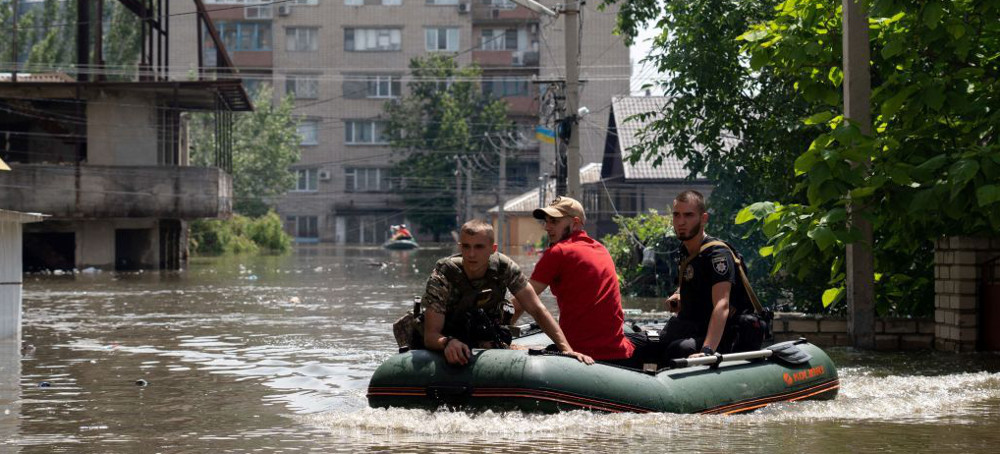 Ukrainian security forces carry on a boat a local resident during an evacuation from a flooded area in Kherson on June 7, 2023, following the explosion of the Kakhovka Hydroelectric Power Plant's dam. (photo: AFP)
Ukrainian security forces carry on a boat a local resident during an evacuation from a flooded area in Kherson on June 7, 2023, following the explosion of the Kakhovka Hydroelectric Power Plant's dam. (photo: AFP)
A humanitarian and ecological disaster unfolded when the Kakhovka Hydroelectric Power Plant’s dam collapsed in the early hours of June 6. Ukraine’s authorities said the Russian forces intentionally destroyed the dam, presumably to hinder a Ukrainian counteroffensive.
More than 1,900 people, including 103 children, were evacuated from southern Ukraine as of 11 p.m., the Interior Ministry reported.
Earlier in the day, Interior Minister Ihor Klymenko said that that emergency services and volunteers evacuated civilians from the city of Kherson, as well as Kherson and Mykolaiv oblasts.
“As of now, 30 settlements, including 20 in Ukraine-controlled territory and 10 in Russia-occupied area, are flooded,” Klymenko, who is in charge of the liquidation of the dam destruction’s consequences, said on national television.
Klymenko also said that the Russian forces are “not evacuating people” from the flooded occupied areas.
The General Staff of Ukraine’s Armed Forces reported in its evening update on June 7 that Russian troops in the occupied settlements of Kozachi Laheri in Kherson Oblast blocked all possible escape routes and banned civilian evacuation.
The authorities contacted the international organizations and are “developing a plan to do everything possible to ensure our citizens can save their lives and health,” Klymenko said.
Oleksandr Khorunzhyi, the State Emergency Service spokesperson, said the water level in Kherson has risen by approximately five meters.
Khorunzhyi said there is currently no information regarding any casualties due to the flooding.
Ukraine's agriculture, which has already sufferred severely due to Russia's war, faces further economic damage.
The Agriculture Ministry warned on June 7 that 10,000 hectares of arable land on the right bank of the Dnipro River in Kherson Oblast are expected to be flooded.
The “several times” bigger farmland area is expected to be flooded in the Russian-occupied territories, the ministry estimated.
The dam explosion also will affect the water supply of 31 irrigation systems of the fields in Dnipropetrovsk, Kherson, and Zaporizhzhia oblasts, where Ukraine harvested some 4 million metric tones of grain and oilseeds worth about $1.5 billion in 2021, according to the report.
The ministry said it would provide further details in the coming days after analyzing the imagery of the affected areas.
Risk of cholera
The flooding provoked by the Kakhovka dam explosion could cause cholera in the affected areas, Deputy Health Minister Ihor Kuzin said on June 7.
“We do not rule out cholera cases. The situation will become clear after the water level decreases,” Kuzin said on June 7, as cited by the Interfax-Ukraine news agency.
Cholera is a diarrheal illness caused by bacteria, typically transmitted through contaminated food or water. While some cases may be mild or asymptomatic, others can be severe and pose a life-threatening risk, according to the Centers for Disease Control and Prevention, the national public health agency of the U.S.
The healthcare official also said that clinics in the affected regions have stocks of drinking water for at least two days, urging locals against consuming dead fish.
At least 150 tons of machine oil have been released into the Dnipro River during the flooding.
The biodiversity of the region is also expected to be heavily impacted. Officials are already observing the death of local fish populations.
Tens of thousands of fish have died in Dnipropetrovsk Oblast after Russia's destruction of the Kakhovka dam the day before, the Health Ministry reported on June 7.
“The same situation may develop in the coming days in other affected regions,” the Health Ministry said.
The ministry also warned that fish might also begin to die in large numbers in Zaporizhzhia and Kherson oblasts in the next three to five days due to a sudden drop in water levels.
Counteroffensive
Secretary of the National Security and Defense Council Oleksii Danilov said in an interview with Reuters that Ukraine has not yet launched its counteroffensive, dismissing Russia’s claims of otherwise.
Dailov said that “everyone will see” when Ukraine starts its counteroffensive.
“When all this will begin, it will be decided by our military,” he said. “When we start the counteroffensive, everyone will know about it, they will see it.”
Danilov also said the Russian officials mistakenly interpreted local Ukrainian advances in certain areas as the beginning of a larger operation.
Ukraine is ready for the counteroffensive, President Volodymyr Zelensky said in an interview with the Wall Street Journal released on June 3.
Deputy Defense Minister Hanna Maliar reported on June 7 that Ukrainian forces went on the offensive near Bakhmut in Donetsk Oblast, making small advances in the area.
Land Forces Commander, Colonel General Oleksandr Syrskyi, said that Ukraine’s forces advanced on Russian flanks near Bakhmut, gaining ground.
The Russian regular army has been replacing the Wagner Group near Bakhmut after the mercenary outfit boss, Yevgeny Prigozhin, announced these troops would withdraw after claiming that Bakhmut had been captured on May 20.
Ukraine hasn’t formally admitted the claim.
While fighting around Bakhmut is still ongoing, the industrial city with a pre-war population of 73,000 has been turned into scorched earth after almost a year of intense fighting.
READ MORE 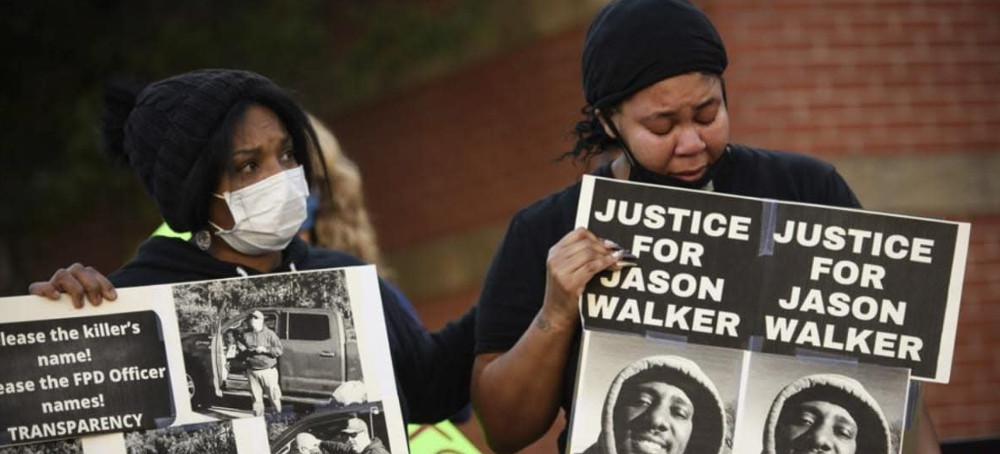 Pandora Harrington (right) cries and is comforted as she holds a sign with an image of Jason Walker during a demonstration in front of the Fayetteville Police Department on Jan. 9, 2022, in North Carolina. Walker was shot and killed by an off-duty sheriff's deputy in Fayetteville. (photo: AP)
Pandora Harrington (right) cries and is comforted as she holds a sign with an image of Jason Walker during a demonstration in front of the Fayetteville Police Department on Jan. 9, 2022, in North Carolina. Walker was shot and killed by an off-duty sheriff's deputy in Fayetteville. (photo: AP)
Off-duty police officers kill Black men in the United States at higher rates than they do their white and Hispanic counterparts.
In a study published June 5 in the journal Health Services Research, Yale researchers noted that out of 242 occurrences between 2013 and 2021 in which police killed people while not on duty, approximately 40% of the victims were Black men, according to YaleNews. The second and third-most frequent victims were white men at 25.2%, then Hispanic men at 11.2%.
The U.S. Census Bureau reported just 6.3% of Americans identified as Black men in 2021. The Yale study indicated that Black men comprised 39.3% of those slain by off-duty police officers.
Nearly all victims were shot, and less than half allegedly possessed weapons during their murders.
The Yale study — using data from the Mapping Police Violence database and news articles from Media Cloud — also found that off-duty officers frequently escalated situations deemed confrontational, that many deadly happenstances took place while they were working second jobs as security officers, and officers often hid information regarding their complicity in cases that turned lethal.
In addition, researchers discovered that news media sources were three times more likely to mention these violent episodes when victims were Black or Hispanic than when victims were white. They urged outlets to cover all murders committed by off-duty police officers, regardless of the victim’s race and to talk with various sources rather than relying solely on police assertions.
Emmanuella Asabor, the study’s principal author and an M.D.-Ph.D. student at Yale, noted that while a growing body of research is assessing many facets of policing, the behaviors of off-duty police officers remain understudied.
“Due to the weapons allowances for off-duty police officers and that off-duty and even veteran police officers are imbued with a great degree of power to intervene,” Asabor said, “we felt that off-duty policing was worthy of investigation.”
Separating this data by the racial and ethnic origin of victims, the researchers also assessed whether information about violence committed by off-duty police officers was consistent with data regarding violence committed by police officers while on duty.
The study found that Black women were more likely than any other racial or ethnic group to have been killed by off-duty police — 12.8% vs. 87.2% killed by on-duty officers. In contrast, only 1.5% of white men were killed by off-duty cops, as opposed to 98.5% of those on duty.
“That says to us that the rate of off-duty police perpetrated killings of Black women diverges from broad public discourse on policing,” Asabor said, “which tends to under-estimate the overrepresentation of Black women among policing victims.”
Numerous other patterns emerged from a qualitative review of the episodes. Researchers discovered that cops regularly killed friends, family members or other officers inside their social networks.
During these violent incidents, sources claim police were frequently inebriated or mentally ill. Reports also noted a lack of transparency in several of these incidents, with police concealing or suppressing information regarding their participation.
The findings led the researchers to suggest several regulations, such as a rule requiring cops to put their service guns away after their shifts are over and a definition of when off-duty officers should step in. The results also indicate the need for more specific legislation and a better analysis of off-duty officers’ actions.
“There needs to be clear, widespread guidance,” said Asabor, YaleNews reported, “preferably at the federal level, on what types of situations call for off-duty officer intervention and how we can document those interventions after they happen.”
READ MORE 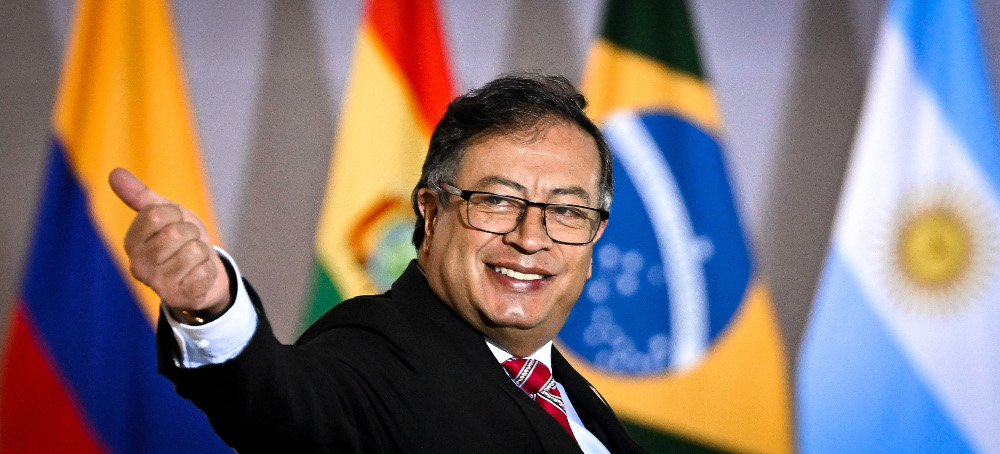 President of Colombia Gustavo Petro gestures to journalists upon his arrival at the Itamaraty Palace, in Brasilia, May 30, 2023. (photo: Mateus Bonomi/AP)
President of Colombia Gustavo Petro gestures to journalists upon his arrival at the Itamaraty Palace, in Brasilia, May 30, 2023. (photo: Mateus Bonomi/AP)
A prominent set of progressive leaders are coming to the defense of Colombia’s Gustavo Petro, whose administration is facing a cascading series of struggles.
The letter is signed by the former Colombian President Ernesto Samper; Gleisi Hoffmann, head of the Workers’ Party, the current ruling party of Brazil under Luiz Inácio Lula da Silva; Rafael Correa, the former president of Ecuador; former Spanish President José Luis Rodríguez Zapatero; and the former heads of opposition parties around the world, including Jeremy Corbyn of the United Kingdom and Jean-Luc Mélenchon, a former French presidential candidate.
“Ever since the election of the country’s first progressive government,” the letter reads, “Colombia’s traditional powers have been organizing to restore an order marked by extreme inequality, environmental destruction, and state-sponsored violence.” The letter comes in defense of a Petro administration facing a cascading series of struggles.
Petro, a former guerilla, swept to power in June 2022 pledging peace deals with the country’s remaining rebels, along with a robust domestic policy agenda. But he lacked a majority in Congress and created a coalition with rival parties that included ceding control of some ministries. His health care reform effort was shot down by Congress, and the peace deals remain elusive. His top aides recently resigned after getting caught up in a bizarre scandal in which state resources were used to surveil a nanny they suspected of having stolen money. The scandal deepened with the release this weekend of audio of the top aides bickering and threatening to release damaging information related to Petro’s campaign.
Petro said that he has nothing to fear from the ongoing investigations, though the group of progressive leaders is less sanguine about the politics. “[T]hey are deploying the combined institutional power of the country’s regulatory agencies, media conglomerates, and judiciary branch to halt its reforms, intimidate its supporters, topple its leadership, and defame its image on the international stage,” the group of more than 400 international progressives warns.
In January, nine members of Congress, led by Rep. Hank Johnson, D-Ga., penned a letter to Francisco Palmieri, chargé d’affaires at the U.S. Embassy in Bogota, Colombia, expressing concern about the security of Vice President Francia Márquez. Explosives had recently been discovered near her home. The letter was also signed by Reps. Barbara Lee, D-Calif.; Raúl Grijalva, D-Ariz.; Rashida Tlaib, D-Mich.; Jim McGovern, D-Mass.; Ilhan Omar, D-Minn.; Mark Pocan, D-Wis.; Cori Bush, D-Mo.; and Alexandria Ocasio-Cortez, D-N.Y.
The Wednesday letter took particular aim at the opposition’s use of the offices of inspector general and attorney to target Petro and his allies. Those investigations could lead to the expulsion of party members from Parliament or even the removal of Petro, the letter warned, adding that “established legal precedent at the Inter-American Court of Human Rights” insists that administrative bodies lack such power. One senator, Wilson Arias, for instance, is being investigated for “slandering” the police as a result of critical comments he made about them in 2021.
Gimena Sánchez-Garzoli, a Colombia human rights advocate at the Washington Office on Latin America, said that many of the investigations appeared to be an abuse of power. “The Attorney General is abusing his power to undermine the Petro government’s policies,” she told The Intercept. “The motivations of the Inspector General to open up cases against members of the Historic Pact are questionable.”
The scandal involving Petro’s top aides, she said, has been overblown by the media but did raise questions about why he allowed Armando Benedetti, one of the top aides who recently resigned, to run his campaign.
“The reaction of the opposition and media outlets in relation to the scandal involving Benedetti and [Laura] Sanabria is overblown,” she said. “It appears they were waiting for a reason to push forward a campaign to discredit the Petro government. At the same time, Benedetti has a problematic history, and it is hard to understand why Petro would have him run his presidential campaign.”
The full letter:
Ever since the election of the country’s first progressive government — led by President Gustavo Petro, Vice President Francia Márquez and the Historic Pact in Congress — Colombia’s traditional powers have been organizing to restore an order marked by extreme inequality, environmental destruction, and state-sponsored violence.
Now, less than one year from the inauguration of the Petro government, they are deploying the combined institutional power of the country’s regulatory agencies, media conglomerates, and judiciary branch to halt its reforms, intimidate its supporters, topple its leadership, and defame its image on the international stage.
From the Offices of the Inspector General and the Attorney General respectively, Margarita Cabello and Francisco Barbosa are actively targeting members of the Historic Pact with investigations that may result in the suspension, dismissal and disqualification of members of Congress such as Senator Alex Flórez, Senator Alexander López, House President David Racero, Representative Susana Gómez, lead peace negotiator María José Pizarro — and even President Petro himself.
In the case of Senator Wilson Arias, for example, Cabello — a close ally of former President Álvaro Uribe who served as Justice Minister under the previous administration of Iván Duque — has filed charges for suspension from the Senate for the “crime” of speaking out against police violence during the 2021 national protests: a flagrant violation of the established legal precedent at the Inter-American Court of Human Rights that prevents administrative bodies like the Office of the Inspector General from removing elected officials from office.
Meanwhile, former generals, colonels, and members of the Colombian military have not only proclaimed their opposition to President Gustavo Petro — but even marched outside Congress to call for a coup d’etat against his government.
The goal of this coordinated campaign is clear: to protect the interests of Colombia’s traditional powers from popular reforms that would raise wages, improve healthcare, protect the environment, and deliver ‘total peace’ to the country.
We, the undersigned, call on friends of the Colombian people and allies of democracy everywhere to stand up against these insidious tactics and prevent the advance of a soft coup in Colombia.
READ MORE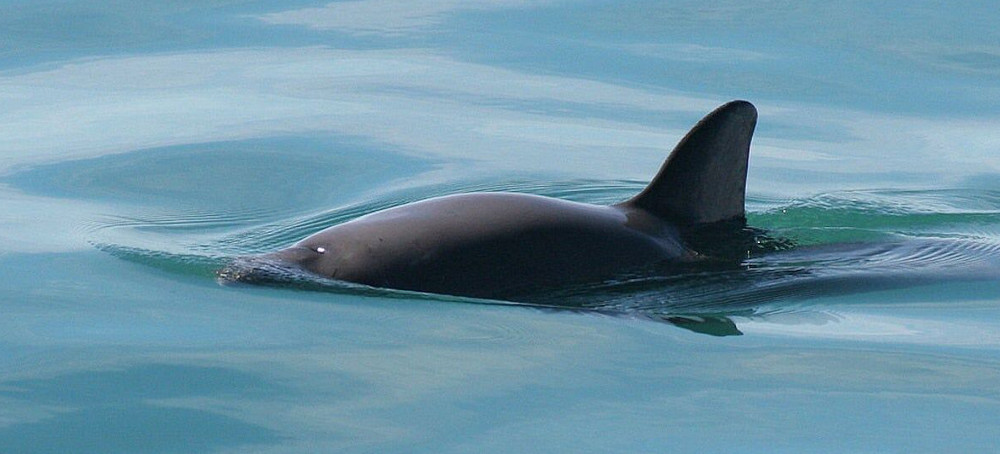 A vaquita porpoise. (photo: Sea Shepherd US)
A vaquita porpoise. (photo: Sea Shepherd US)
Vaquitas have been hanging on against all odds, despite the consistent threat of entanglement in gillnets used to illegally catch totoaba, a large fish that is also endangered and exclusively inhabits the Gulf of California. Totoaba are illegally caught for their swim bladders, sold to China at a premium for their purported medicinal properties.
According to a report from a recent research expedition that took place from May 10 to 26, from 10 to 13 vaquita were spotted by experts while sailing in a corner of the gulf where a similar number of the cetaceans were last seen in 2021, reported The Associated Press.
“We estimated that the sightings included 1-2 calves and there was a 76 percent probability that the total number seen, including calves, was between 10 and 13 individuals,” said a report issued by the NGO Sea Shepherd spearheading vaquita conservation efforts, as Phys.org reported. “Since the search was in a small portion of the vaquita’s historical range, 10-13 is considered a minimum estimate of the number of vaquitas left.”
Vaquitas are sometimes referred to as the “pandas of the sea” because of the dark rings around their eyes. They grow to about five feet in length and weigh around 120 pounds. Vaquitas can live to be at least 21 years old, and it is believed that females give birth to a single calf every other year, according to the U.S. National Oceanic and Atmospheric Administration (NOAA).
Vaquita are often seen from afar through binoculars, and their “clicks” are picked up by acoustic monitoring devices, reported The Associated Press.
Experts from Sea Shepherd, NOAA and Mexico said there could be more vaquitas in the Sea of Cortez, since the expedition only searched part of their habitat.
Alex Olivera, the Mexico representative for the Center for Biological Diversity who did not take part in the expedition, commented that “this is encouraging news and it shows that vaquita are survivors. But we still need urgent conservation efforts to save these tiny porpoises from extinction,” as The Associated Press reported.
The vaquita population has been steadily declining due to the deadly gillnets and is down from nearly 600 in 1997 and 200 in 2008, according to NOAA. The Gulf of California’s Sea of Cortez makes up the vaquitas’ entire range, and attempts to capture and breed the timid porpoises have failed.
The Mexican government has attempted to halt gillnet fishing in the vaquita’s range by sinking concrete blocks fitted with hooks to snag the nets, but the fishing has continued, reported The Associated Press. Not only have fishers ignored the ban on gillnets in the porpoises’ range, they have sabotaged efforts to monitor them.
The expedition report noted that “fishermen have begun removing the acoustic devices (CPODs) used to record vaquita clicks. The data recorded on each device is lost, and it is expensive to replace the stolen CPODs. Unless enforcement of the fishing ban is effective and the theft of equipment is stopped, acoustic monitoring cannot collect data as it has in the past,” The Associated Press reported.
Sea Shepherd has been working with the Mexican Navy to discourage illegal fishing in the “no tolerance” zone of the vaquita refuge, but the illegal fishing has continued.
The administration of Mexican President Andrés Manuel López Obrador has mostly refused to compensate fishers for ceasing to use gillnets in the area or monitor their activities there.
Chairman of Sea Shepherd Pritam Singh said patrols alongside the Mexican Navy lessened the amount of time fishing boats are in the restricted area by 79 percent last year, compared with the year before.
“It’s the biggest conservation success for vaquita that I’ve seen in 30 years,” said Barbara Taylor, a biologist and vaquita expert who recently retired from NOAA Fisheries and led the survey, as reported by The New York Times.
The last expedition in October of 2021 had 5 to 13 likely vaquita sightings, down from a survey two years earlier, The Associated Press reported.
Olivera estimated that “even in a gillnet-free habitat, it will take about 50 years for the population to return to where it was 15 years ago,” adding, “we need Mexico to urgently comply with existing regulations to prevent the vaquita from disappearing forever,” as reported by The Associated Press.
The Gulf of California was added to the United Nations Educational, Scientific and Cultural Organization’s World Heritage in Danger list due to concerns of the imminent extinction of the vaquita.
“A lot of very experienced people thought that the vaquita would be gone by now,” said Kristin Nowell, executive director at Cetacean Action Treasury, a nonprofit organization dedicated to saving the vaquita, as The New York Times reported. “The fact that it’s doing better than expected gives Mexico one more chance to get this right.”
Follow us on facebook and twitter!
PO Box 2043 / Citrus Heights, CA 95611

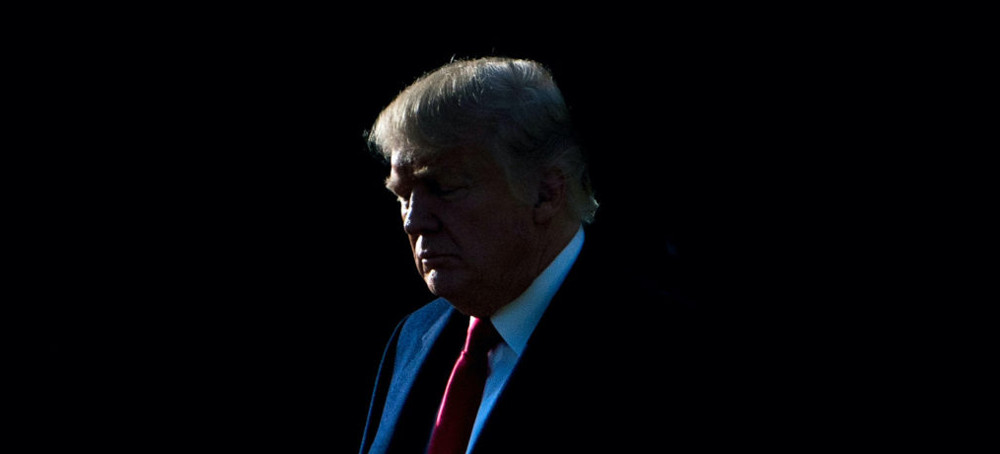

No comments:
Post a Comment
Note: Only a member of this blog may post a comment.